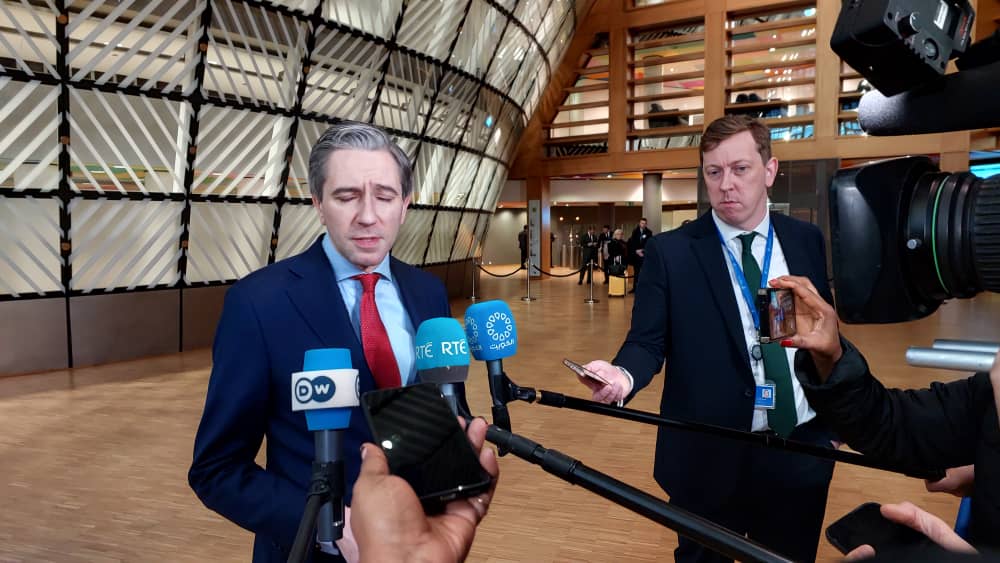Foreign news
EU Cautiously optimistic on Syria engagement – Official

Irish foreign minister Simon Harris said on Monday that the European Union (EU) “is cautiously optimistic on Syria engagement” but called for more deeper engagement to strengthen relations with the country.
Harris said this at a news conference held at the EU Headquarters in Brussels, the Belgian capital.
“It’s early days, but I think there are signs of optimism. But it is important that we continue to engage.
“I don’t think it would be a good scenario if any other geopolitical actors and forces engage with Syria and for the European Union not to be in a position to intensively engage with them,“ he said.
In her remarks, Ms. Kaja Kallas, the Vice-President of the EU described Syria’s future as fragile but said that the bloc needed to take the right steps.
“But of course, we need to see the right steps as well. Right now, they’re saying all the right words, and they are doing also the right things.
“Therefore, we have this set step-for-step approach, and if they take the steps, then we are willing to take the steps as well,’’ she said.
On the war in Gaza, Harris said President Donald Trump and his team are very much a party to the ceasefire deal between Israel and Hamas after the intensive work that was put in.
He conceded that the Trump administration put in a lot of effort to arrive at a ceasefire agreement in the days before his assumption of office for a return to the White House.
“I think that was important and there is no doubt that the intensive work invested by the Trump administration played a very significant role in helping to bring about a ceasefire – a ceasefire that has now seen a cessation of hostilities, the killing, and the bombings.
“Also, that has seen the flow and has seen hostages being released. It’s really important that the ceasefire is in place.
“It is also important, though, to acknowledge in that ceasefire agreement itself, it does talk about people being able to return, and therefore, I think it’s important that we’re consistent in the approach that we take.
“The priority, I think, needs to be on implementing to the letter, the ceasefire agreement.”
Foreign news
Pakistan Moves to Deepen Diplomatic, Economic Relations With Nigeria

The Government of the Islamic Republic of Pakistan has called for deeper diplomatic and economic ties with the Nigerian government to foster development for both countries.
Mr Rana Ihsaan, the Coordinator to the Prime Minister of Pakistan made the call in an interview with the News Agency of Nigeria (NAN) during his working vist to Nigeria on Wednesday in Abuja.
NAN reports that the visiting Coordinator held a closed-door meeting with Yusuf Tuggar, the Minister of Foreign Affairs.
After the meeting, he said that both both sides had agreed on deepening relations in the areas of trade and commerce, among others.
Ihsaan said that both countries must see the need to accelerate efforts towards a Bilateral Trade Agreement (BTA).
He said that Pakistan had already submitted a draft BTA and was awaiting Nigeria’s response.
According to him, discussions centered on easing visa processes, expanding educational exchanges, and strengthening Cooperation in sectors such as Minerals, Youth training, and Defence were highlighted.
Ihsaan said that Pakistan had already implemented visa-on-arrival for Nigerians at no cost, and urged Nigeria to reciprocate to enhance people-to-people ties.
He stressed the importance of high-level engagements between both nations, describing Nigeria and Pakistan as very similar countries with large populations, youthful demographics, and vast economic potentials.
“Deeper collaboration will unlock opportunities in trade, education and investment, while further solidifying long-standing diplomatic relations,” he said.
He said that aside from visiting the foriegn Minister and other top government officials in Nigeria, he was also in the country to attend the on-going West Africa Beauty Exhibition holding in Lagos.
He described the exhibition as one of the continent’s largest cosmetic fairs, adding that he led a delegation of 19 Pakistani business people exploring Nigeria’s estimated 10 million dollar beauty and cosmetics market.
Ihsaan said that Nigeria was a gateway to Africa, adding that Pakistani products, like cosmetics, Textiles, Pharmaceuticals, Food items and Sports goods were already gaining traction in the country.
He encouraged Pakistani exhibitors to establish offices, Warehouses and logistics partnerships to strengthen their foothold in the Nigerian market.
Ihsaan further addressed concerns from Nigerian businesses on the ease of doing business in Pakistan.
He said that the Trade Development Authority of Pakistan had been supporting Nigerian participants at major exhibitions to achieve the ease of doing business.
“The Special Investment Facilitation Council (SIFC) serves as a one-stop platform for Nigerians interested in investing in Pakistan,” he said
Culled from NAN
-

 Featured6 years ago
Featured6 years agoLampard Names New Chelsea Manager
-

 Featured6 years ago
Featured6 years agoFG To Extends Lockdown In FCT, Lagos Ogun states For 7days
-

 Featured6 years ago
Featured6 years agoChildren Custody: Court Adjourns Mike Ezuruonye, Wife’s Case To April 7
-

 Featured6 years ago
Featured6 years agoNYSC Dismisses Report Of DG’s Plan To Islamize Benue Orientation Camp
-

 Featured4 years ago
Featured4 years agoTransfer Saga: How Mikel Obi Refused to compensate me After I Linked Him Worth $4m Deal In Kuwait SC – Okafor
-
Sports3 years ago
TINUBU LAMBAST DELE MOMODU
-

 News11 months ago
News11 months agoZulu to Super Eagles B team, President Tinubu is happy with you
-
Featured6 years ago
Board urges FG to establish one-stop rehabilitation centres in 6 geopolitical zones
